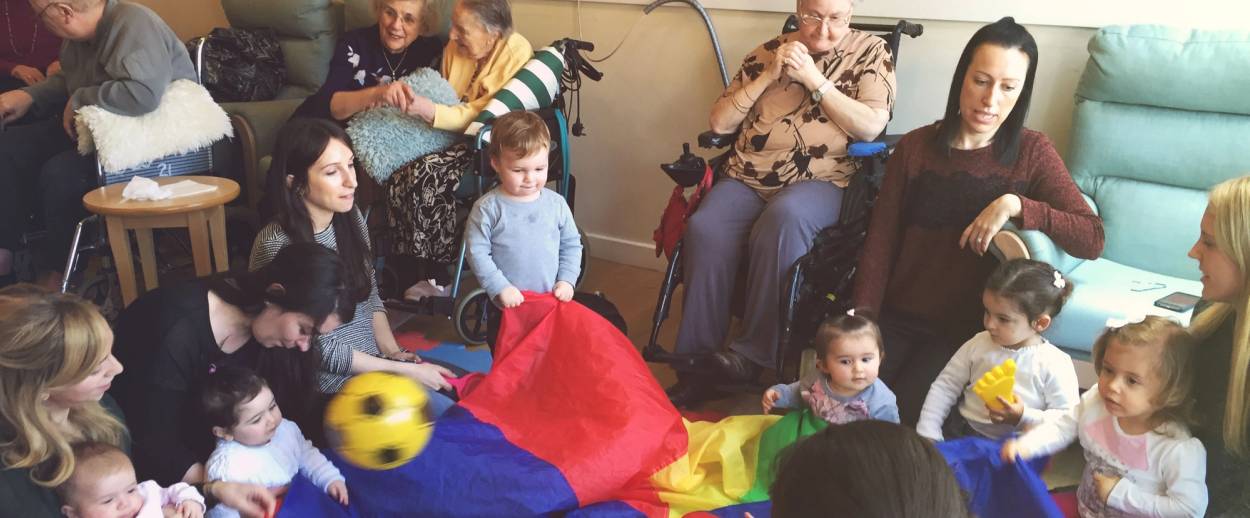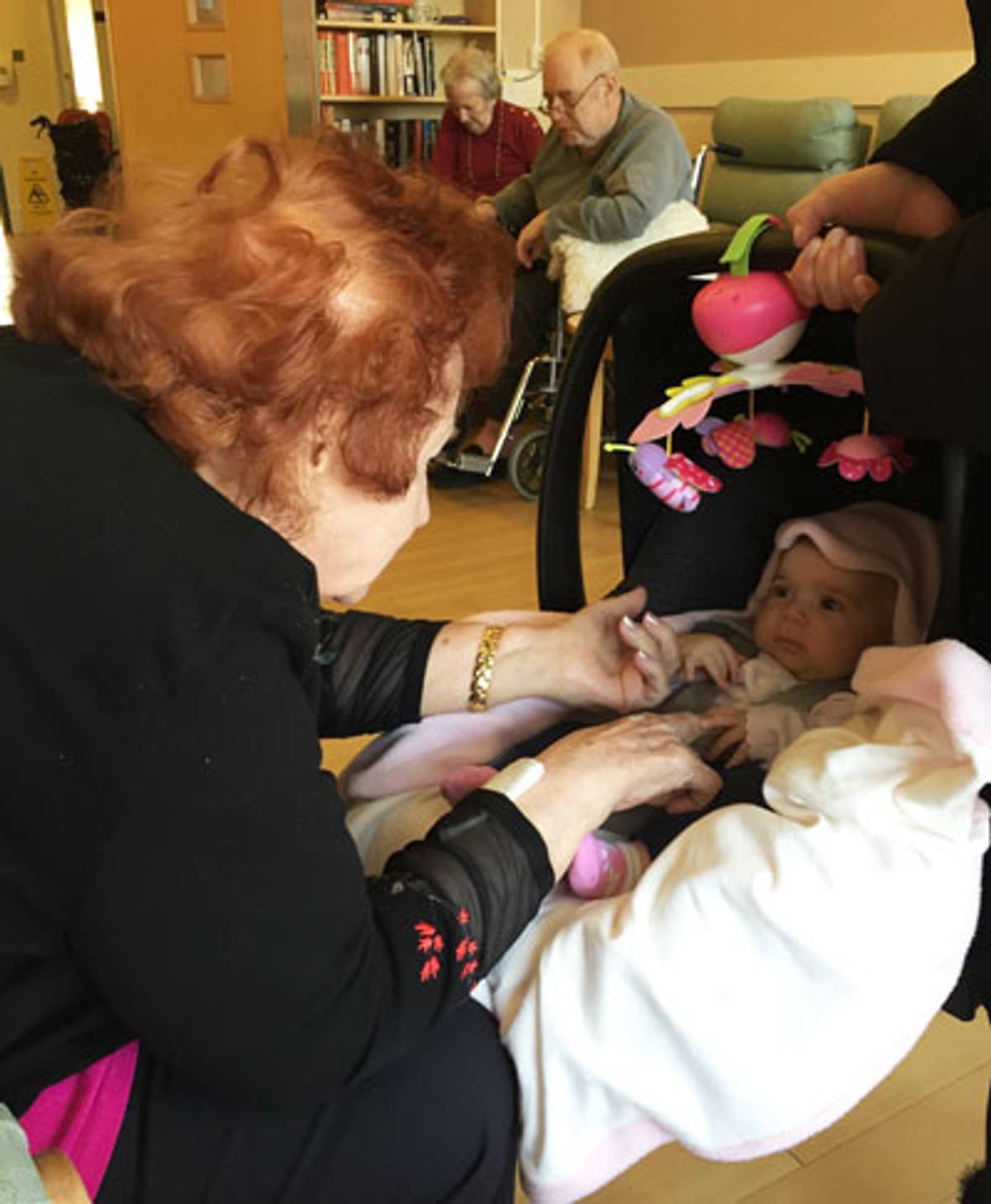Bridging the Generation Gap, With Nursery Rhymes
A new program in London brings old and young together—one incy, wincy spider at a time




On a recent Monday morning in the lounge at Rubens House—a Jewish Care home for the elderly in Finchley, north London—the residents patiently gathered as they do at this time every week. One by one, seven babies came through the doors with their mothers, until a small traffic jam of strollers and wheelchairs clogged the entrance.
Rosie’s Little Bubalas, a weekly music group for babies and toddlers held in an English old folks’ home, was set up in 2015 by north Londoner Jenna Kay, now 32. She named the group in memory of her grandmother, Rosie Sweet, who spent the last year of her life at a different Jewish Care home in Stanmore, north London. Before Sweet died in November 2014, Kay used to bring her daughter Elise, now nearly 2, on visits to see her grandmother. Seeing Elise brought her grandmother and the other residents “so much more happiness than I could have ever done alone,” Kay told me by email before I visited. “We would often spend our afternoons singing nursery rhymes together, and all the residents wanted to be involved and see my little girl.”
Sweet lived a long and happy life, “full of love and family,” said Kay. She came from a religious family of kosher butchers—the Robotkins— in London’s east end and, Kay told me, “was so incredibly proud of her heritage.”
When Sweet died, Kay had the idea of setting up a small toddler music group “to bring happiness to other residents in her memory,” but she felt it would be too emotional for her to hold the group at the home where her own grandmother had lived. The home’s volunteer department recommended Rubens House, another facility in the same network of “care homes.”

Kay bought some props—a parachute, glow stars, balls, a bubble machine—and started the classes at Rubens House last summer. She’s been here every week since, with a steady flow of mainly Jewish thirtysomething north London mothers taking part with their young children; they hear about the group through social media and word of mouth. “It is so special seeing how much joy the babies bring the residents,” Kay said. “Their eyes light up as soon as they see the babies.”
Around 10 elderly people were energetic enough to take part on the Monday when I visited—some sitting in easy chairs with their walkers close at hand, but the majority in wheelchairs. As the lively babies and mothers found space on a mat in the middle of the room, the residents waited quietly and patiently in a circle around them. One of the residents suddenly became sick and needed to be cleaned up and taken away to rest. Meanwhile the children, mostly around 6 to 18 months old, had their dribble wiped away by their mothers, while they played and laughed.
The first song started: “If you’re happy and you know it, clap your hands.” And the old people started smiling and clapping along with the mothers and babies.
Joan Bayes, a volunteer at the home, moved from resident to resident, grasping their hands and warmly encouraging them to “dance” in their seats. When the babies were handed shakers, glow-stars, and pom-poms, Bayes passed more out to the elderly people, too. Some refused them with sighs or bemusement but others held them enthusiastically, shaking them as they sang and clapped along with “Incy Wincy Spider” and “Twinkle, Twinkle, Little Star.” One man, Jack Faulkner, when handed a plastic chicken during “Old McDonald Had a Farm,” muttered delightedly: “For Shabbos!”
“Some have to be persuaded to join in,” Bayes said, “but it’s so good for them.” Most of the residents remained in their own worlds throughout the session, their eyes blearily opening and closing as they dozed and woke repeatedly, but others expressed their enjoyment of the day. One 87-year-old resident, who identified herself simply as Mrs. Rosenberg, murmured, “Thank you—very nice,” as she sat with a blanket in her lap. Faulkner, who’s a regular every week, shook a pom-pom during a different song: “It’s the best entertainment,” he said. “They’re little angels, and not one is crying.”
One resident, 85-year-old Sadie Simmons, was especially chatty and alert, cooing over the babies as the mothers paraded them around the room for “The Grand Old Duke of York.” “Anyone want to give one away?” she joked, and then she complimented the children’s marching: “Fantastic! Very clever children.”
The last few songs were golden oldies aimed at the seniors rather than the children: “Singing in the Rain,” “We’ll Meet Again,” and “I’m Forever Blowing Bubbles.” The residents who had been dozing woke up and moved their lips to the lyrics: “Pretty bubbles in the air … then like my dreams, they fade and die. Fortune’s always hiding … to the lands of hope I stray.”
“Sometimes it takes the whole session for some to start singing,” said Bayes, “but music brings back memories.”
A nurse caregiver, Titilayo Shajobi, said of the residents, “Even if they’re in a bad mood, it makes them happy. If the children weren’t here, they’d be sleeping. The children remind them of being young, or their own grandchildren.”
***
The idea of children being brought into old people’s homes is not a new one. The doctor and author Atul Gawande wrote in his recent best-seller Being Mortal about the beneficial effect of mixing young and old—as is standard in other cultures and in history, but all too rare in modern Western society.
The deadening, institutional nature of any nursing home can be softened by contact with children. In his book, Gawande praised a visionary Jewish Care home, NewBridge in Boston, which shares grounds with a kindergarten and school. There, veterans of WWII teach young people using their firsthand accounts, children and the elderly share fitness classes and celebrations, and close relationships between generations flower.
Being Mortal also tells the story of physician Bill Thomas, who transformed Chase Memorial Nursing Home in New Berlin, New York, when he became director in the early 1990s; among other things, Thomas put a playground for children on the grounds and encouraged staff to bring their children to play after school. Because of this (as well as having animals and plants brought into the care home), Gawande wrote, residents were given “real opportunity to grab onto something beyond mere existence. And they took it hungrily.” Thomas reported the “magic” of seeing “people come alive … begin to love and to care and to laugh.”
It’s easy to understand why the residents would enjoy having the children around. But what do the mothers who bring their children get out of it?
Coral Crann, who brought her 8-month-old, Gabriel, told me on her way out that she has been coming for two months. “It’s a little mitzvah,” she said. “Seeing the smiles on the residents’ faces, and on the babies’ faces, too. … It’s a winner.”
Avital Navazesh, mother to 9-month-old Ariella, has been coming for five months. “It’s a community feeling,” she said. “It’s not just about the children loving it—it’s a level beyond.” She handed Ariella to Sadie Simmons for a cuddle; the little girl waved happily in Simmons’ arms.
Another baby much admired by Simmons—Ella, only 11 weeks old—came with her mother Nicky Bensoor for the second time. Bensoor told me that two of her grandparents are in homes and she knows “they’d love something like this.”
Kay, who recently resigned from her job in finance, plans to expand her original program into Jewish Care’s Little Bubalas, with new groups to be set up in different nursing homes around England, each in honor of a special person, like her own grandmother.
The first new offshoot started in February at the Betty and Asher Loftus Centre in Barnet, Hertfordshire, run by Esther Lee, a mother who attended Rosie’s Little Bubalas and fell in love with the idea. Lee said: “I was so inspired by what Jenna had done. Not only do I enjoy running these sessions, but it teaches my daughter so much, too. I love watching her interacting with the residents. I’m excited to see where this journey takes us.”
Kay is currently organizing a third regular session—run by another mother at the home where Rosie Sweet lived—and is now looking for “lots more interested people to make this dream a reality.”
A spokesperson for Age UK, a British charity for the elderly, didn’t know of any other groups like this. And although Kay has heard of one or two occasional music sessions run by professional musicians that include children in care homes and notes that Jewish Care already includes children at special celebrations, like lighting the candles at Hanukkah, she said: “As far as I’m aware, my concept of encouraging regular mums to set up and run these classes every week is a completely new idea.”
Kay is considering introducing some Jewish songs and fancy dress to celebrate festivals like Purim in the future, but said she aims to keep the sessions “inclusive of mums and babies of all religions, encouraging all to attend.”
Jewish Care’s activities manager Christina Nimako, who worked with Kay to organize Little Bubalas, said: “We hope that more homes will follow us in setting up these groups—we can see how it improves residents’ quality of life and can thoroughly recommend it. Residents who have dementia and don’t normally communicate much have started to join in with singing nursery rhymes—it really brings them to life. It gives them something to look forward to, an hour of pleasure, and an improved sense of well-being afterwards.”
“The young meeting the old is very lovely,” said Simmons. “It gives me that warm loving feeling.” She chooses to live in the home and is often visited by her own great-grandchildren—but, Bayes stressed, this group “is even more important for people who don’t have family.”
***
Like this article? Sign up for our Daily Digest to get Tablet Magazine’s new content in your inbox each morning.
Olivia Gordon is a British freelance journalist who writes for a wide variety of newspapers, magazines, and websites.